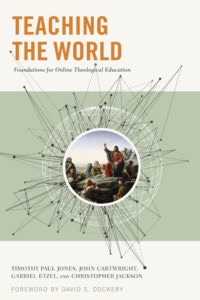online theological education
Select an item by clicking its checkbox

Teaching the World: Foundations for Online Theological Education
Date Reviewed: April 17, 2018
Teaching the World is a welcome volume on online theological education that seeks to ground educational practice with a theological foundation. The work is a critically needed guide that directs leaders and administers in developing online education programs. Readers will find practical insight on program development on three levels: framework, faculty, and classroom.
An introductory chapter entitled, “Past Patterns and Present Challenges in Online Theological Education,” describes the delivery of theological education from the early days of correspondence in the eighteenth century to the current practice of providing multimedia curricula fully online. After advocating the legitimacy of online theological education, the authors maintain that educational institutions have often not built their online programs on theological foundations. Instead, they have unwittingly overlooked this step in their rush to launch programs for primarily pragmatic reasons – increased enrollment and profitability.
The balance of the book is divided into three sections. Section I, “Better Foundations for Online Learning,” examines the role of the Pauline Epistles in theological education, ministry preparation, and spiritual formation from a distance. The authors argue that Paul\'s Epistolary practice provides biblical support for theological education from a distance and an example of how to deliver it. Subsequent pages integrate “social presence theory” with Paul\'s epistolary practice, resulting in a conceptual framework for online program development.
Section II, “Better Faculty for Online Learning,” provides theological guidance for faculty roles in online programs. Here the authors argue for faculty who: (1) emphasize the spiritual formation of students over the mere transfer of knowledge, (2) demonstrate the ability to leverage the medium of online education to accomplish the desired outcomes for students, and (3) model the theological and professional standards for ministry. In such an environment, online faculty members embody the values of the institution and effectively facilitate the desired outcomes of programs.
Section III, “Better Practices in the Classroom,” maintains that the students’ ministry contexts make effective online learning possible. Students in online programs are typically older and engaged in some form of ministry. Consequently, online programs should incorporate adult learning theory and facilitate learning in the student’s ministry context – the local church serving as an active partner in ministry preparation.
A concluding chapter, “To Teach, to Delight, and to Persuade,” argues that online programs are not a replacement for residential programs, but are a means for developing stronger partnerships for ministerial preparation. This book’s emphasis on using theology as a conceptual framework for online theological education is its conspicuous strength.
Teaching the World: Foundations for Online Theological Education presents a grand vision for online theological education that is particularly valuable for leaders of theological schools who seek to develop online programs that are effective in fulfilling the educational outcomes of their institutions.